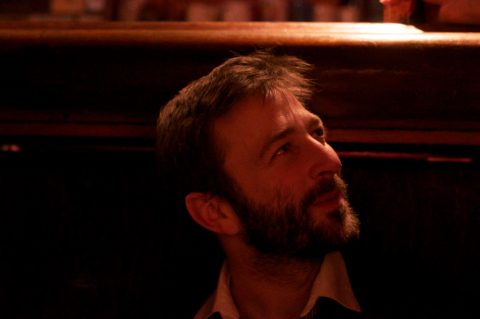How do you think living in the Midwest has influenced your writing?
I grew up in North Carolina, but Chicago, for whatever reason, was always the image I had filed in my head next to the entry for “City, Big.” Chicago is famously a city of neighborhoods, without much geography aside from the lake. You move through the city and nothing’s that different physically but somehow the sense of things around you shifts—the language changes, Spanish drifts over into Polish, sidewalks get more or less populous, the concept of space between pedestrians changes. You discover things—an Orthodox church designed by Louis Sullivan, a museum with a collection of trepanned skulls, a store that sells only gourmet peanut butter. The feeling that things have shifted so slightly and yet are now completely and dizzyingly different, that’s something that I want to capture.
You wrote (said?) one of my favorite definitions of flash fiction in an interview with LARB: “Flash fiction is almost always about setting something in motion, stopping the story, and hopefully for the reader that thing continues into motion.” What are some of your favorite flash stories that align with that definition? Is there a story you like, maybe love, that can’t be described that way?
James Tate, though he’s a poet (mostly) rather than strictly speaking a prose writer, writes poems that often read like flash fiction (and have occasionally been published as such). He’s fantastic at the former–see, for example, his piece “It Happens Like This.”
Meanwhile, Lydia Davis, who’s an absolute master of the short-short form, almost never does this. Most of the flash fiction writers I like tend to swing for the sublime in their work–that’s part of what I was trying to get at in the quote above, that flash fiction often posits an interesting contradiction and leaves it to the reader to let said contradiction spiral out into infinity. But Davis is very much committed to the aesthetic of the beautiful, I think. She writes very small stories in which, most of the time, the content almost exactly fits the form. There’s a precision that’s absolutely breathtaking. For example, “Conversation in Hotel Lounge,” or the stories in this excerpt from her Collected Stories.
One of the things I’m still considering after reading your story “The Liar” is that you’ve created a character who seems to lie less for what feels like the most common reasons for lying: power, concealing embarrassment. Jane seems to lie overall to construct an identity that she wants for herself.
Both power and concealing embarrassment seem pretty central to identity to me. A lot of our daily impulses to lie seem to have to do , not so much with self-preservation, as with the manufacture and preservation of a certain self.
When you’re creating a character who is a liar, what determinations do you make in the writing process? Do you know what’s real versus what the character says is real?
Sometimes I know what’s real, if it seems important to the story. A lot of times, lying in fiction seems to mostly be about shifting power relationships in certain ways—in such cases, what’s real doesn’t matter as much for the story as what the lying character wants.
How good of a liar is Jane to you?
Reasonably good. Probably better than me.
What advice would you give writers on how to have a successful reading?
I try to think of the page like an instrument I’m playing. I’m not an actor, I don’t recite or declaim (or try not to), but I am conscious of the fact that I’m performing the thing I’m reading. There’s an audience there, and I have a responsibility to them not to bore them. And, likewise, I have a responsibility not to condescend to them (with props, shock tactics, etc).


 The core workshop of SmokeLong Fitness is all in writing, so you can take part from anywhere at anytime. We are excited about creating a supportive, consistent and structured environment for flash writers to work on their craft in a community. We are thrilled and proud to say that our workshop participants have won, placed, or been listed in every major flash competition. Community works.
The core workshop of SmokeLong Fitness is all in writing, so you can take part from anywhere at anytime. We are excited about creating a supportive, consistent and structured environment for flash writers to work on their craft in a community. We are thrilled and proud to say that our workshop participants have won, placed, or been listed in every major flash competition. Community works.